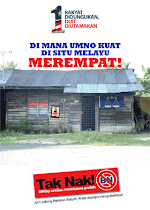Kenyataan media oleh Dato' Seri Anwar Ibrahim selaku Ketua Pembangkang Parlimen Malaysia
Pengumuman terbaru oleh Perdana Menteri bahawa "senario ekonomi terburuk" negara telah berakhir kerana KDNK berkembang pada kadar 4.5% dalam suku terakhir 2009 bukan sahaja dikira terlalu awal tetapi juga tidak bertanggungjawab. Apa yang jelas, pertumbuhan itu sebenarnya dipacu oleh perbelanjaan besar-besaran oleh kerajaan sejak setahun lepas. Suntikan pakej rangsangan, seperti yang diketahui oleh mana-mana ahli ekonomi, sebaiknya adalah langkah sementara dan tidak boleh dilakukan secara berterusan. Oleh sebab itulah, saya amat khuatir kerana kaedah pergantungan yang berterusan kepada perbelanjaan kerajaan secara besar-besaran seperti yang diamalkan Barisan Nasional, akan membawa kita ke kancah permasalahan ekonomi yang sangat serius.
 Saat apabila ekonomi negara yang kini retak akan terbelah dan berkecai sebenarnya sudah hampir tiba. Sejak 1998, kerajaan Barisan Nasional hanya tahu satu dasar ekonomi sahaja, iaitu menaikkan perbelanjaan kerajaan (melalui projek-projek besar yang tidak diperlukan dan membazir kerana melibatkan kepentingan kroni) untuk menutup kegagalannya menarik pelaburan individu dan swasta yang telah jatuh merudum.
Saat apabila ekonomi negara yang kini retak akan terbelah dan berkecai sebenarnya sudah hampir tiba. Sejak 1998, kerajaan Barisan Nasional hanya tahu satu dasar ekonomi sahaja, iaitu menaikkan perbelanjaan kerajaan (melalui projek-projek besar yang tidak diperlukan dan membazir kerana melibatkan kepentingan kroni) untuk menutup kegagalannya menarik pelaburan individu dan swasta yang telah jatuh merudum.
Data pelaburan individu dan swasta sejak 1991 menjadi peringatan bagaimana Barisan Nasional telah mengheret negara ke lembah kehancuran ekonomi. Kalau sebelumnya di antara tahun 1991 hingga 1997 pelaburan individu dan swasta meningkat setiap tahun pada kadar 16.2%, selepas 1998 hinggalah kini kadar ini hanya menokok 1% secara purata sejak 11 tahun lepas.
Mengambil kira kesan inflasi, maknanya di antara tahun 2005 sehingga 2008, pelaburan individu dan swasta kekal tidak berkembang pada tahap RM20.3 billion setiap tahun. Jumlah ini adalah lebih rendah dari jumlah pelaburan individu dan swasta semasa saya mula-mula menjadi Menteri Kewangan dalam tahun 1991, iaitu hampir 20 tahun lalu.
 Pada ketika Barisan Nasional terus hilang punca untuk menghidupkan kembali ekonomi bagi jangka masa panjang, kadar pelaburan individu dan swasta menjunam berbanding dengan tahapnya sebelum tahun 1997. Pada ketika itu, pelaburan individu dan swasta menyumbang 40% kepada KDNK. Malangnya sejak sedekad yang lalu, sumbangan pelaburan individu dan swasta terus merosot secara puratanya kepada kadar 28% sahaja daripada KDNK.
Pada ketika Barisan Nasional terus hilang punca untuk menghidupkan kembali ekonomi bagi jangka masa panjang, kadar pelaburan individu dan swasta menjunam berbanding dengan tahapnya sebelum tahun 1997. Pada ketika itu, pelaburan individu dan swasta menyumbang 40% kepada KDNK. Malangnya sejak sedekad yang lalu, sumbangan pelaburan individu dan swasta terus merosot secara puratanya kepada kadar 28% sahaja daripada KDNK.
Oleh sebab itu, Pakatan Rakyat tidak akan membuat pengisytiharan yang cuai seperti Perdana Menteri bahawa ekonomi kita sudah pulih, kerana masih terlalu banyak masalah pokok yang perlu diselesaikan dengan segera sekiranya kita tidak mahu Malaysia terus tertinggal di belakang.
Tindakan Perdana Menteri merwar-warkan anggaran pertumbuhan 5% bagi 2010 sebagai sangat baik sebenarnya kurang berhemah. Apa yang tidak diwar-warkan oleh Perdana Menteri di sebalik anggaran pertumbuhan 5% itu adalah hakikat bahawa pada kadar tersebut, Malaysia ditinggalkan jauh oleh negara-negara seperti Korea Selatan, Singapura, Taiwan, Indonesia, Thailand, Filipina malahan juga Vietnam dalam tahun 2010 kelak. Malaysia pada suatu ketika adalah setanding dengan Korea Selatan dan Singapura dan jauh lebih maju dari negara-negara yang lain.
Anggaran terbaru yang dikeluarkan oleh IMF pada Oktober 2009 menunjukkan bagi tahun 2010, Malaysia dijangkakan akan tumbuh pada kadar yang paling lembap berbanding kumpulan negara-negara tadi, walaupun ekonomi dunia dijangka akan mula pulih. Vietnam dijangka akan tumbuh pada kadar dua kali ganda lebih baik dari Malaysia dan negara-negara lain akan berkembang pada kadar yang secara puratanya 50% lebih pesat dari Malaysia.
Kerajaan Barisan Nasional perlulah bertanggungjawab dan menerima hakikat bahawa ekonomi kita tersangkut di dalam perangkap seperti yang diumumkan Menteri Kewangan Kedua suatu masa dahulu; adalah disebabkan oleh salahguna kuasa dan rasuah oleh mereka yang berkuasa sejak sekian lama.
Kemakmuran negara pada masa hadapan hanya boleh dijamin oleh sebuah kerajaan yang memikul amanah yang diberikan oleh rakyat dengan rasa tanggungjawab yang tinggi. Maka, persoalan ketelusan dan amalan pentadbiran yang baik adalah prasyarat untuk memulihkan ekonomi negara.
Oleh sebab itu, Pakatan Rakyat akan terus bekerja keras untuk menawarkan kepada rakyat pentadbiran ekonomi yang telus, tulus dan berkembang secara sihat bagi jangkamasa yang panjang demi generasi akan datang.







